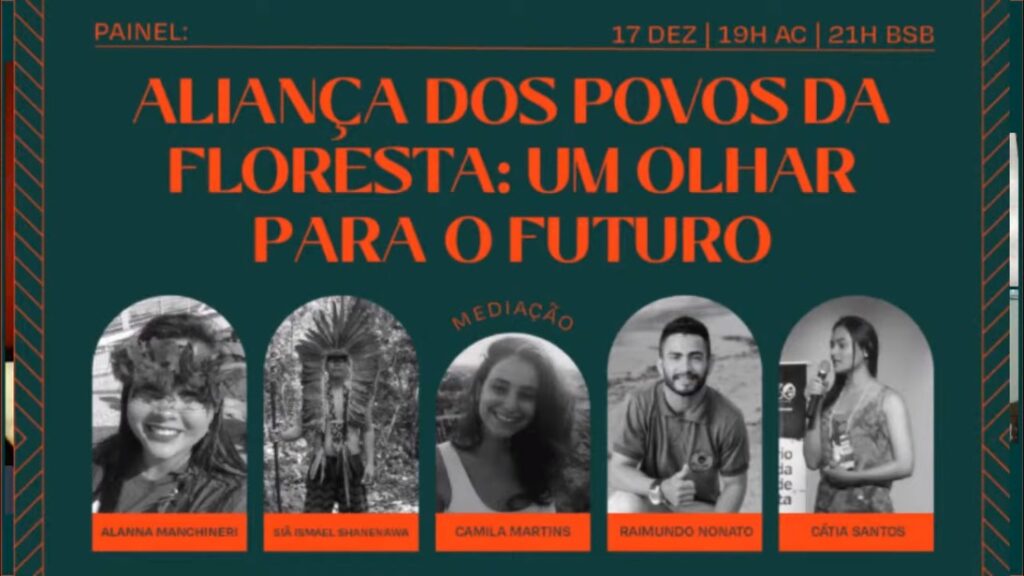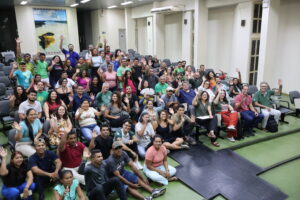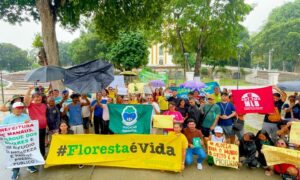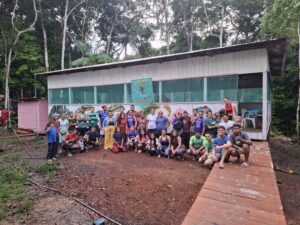By Clara Machado
Raimundo Nonato, resident of the São Raimundo community, represented the mid-Juruá at Semana Chico Mendes 2020, participating in the round table “Aliança dos Povos da Floresta: Um olhar para o futuro”, organized by the Comissão Pró Índio do Acre and Comitê Chico Mendes, mediated by Camila Martins, which took place on December 17th. Raimundo Nonato is a young leader and current youth coordinator for ICMBio, and shared the table with Raimundo Mendes from the Secretaria de Trabalhadores Jovens Rurais in Acre, as well as Alana Manchineri, a young indigenous spokesperson from the Coordenação das Organizações Indígenas da Amazônia Brasileira and Ismael Shanenawa, an agroforestry agent from the Katukina/Kaxinawá Indigenous Territory in Acre.

The Semana Chico Mendes 2020, which brought together round tables covering the struggle and resistance of the “Alliance of Forest Peoples”, started in the 1980s when indigenous leaders and rubber tappers came together to demand rights such as territorial demarcation, economic autonomy and forest preservation. The alliance was fundamental for the inclusion of these guidelines in the Brazilian Federal Constitution of 1988 and today, under a political climate that threatens these basic rights, this Alliance of Forest Peoples is once again of strategic importance.
In his speech, Raimundo Nonato presented the work on monitoring and protecting areas in the mid-Juruá, achieved in collaboration with indigenous communities and long-standing partners, and attributed the success of these conservation actions to the power of collective efforts. In addition, Raimundo brought out the importance of youth to continue the pioneering spirit of previous generations in the struggle, to maintain the engagement and culture of the mid-Juruá region, and to keep alive the history that their predecessors initiated and transmit it to future generations. In his words, “If our grandparents and parents were able to free us from the hands of the rubber barons, we believe that today we have the opportunity of knowledge to continue this legacy and we need to embrace this cause.”
The Young Protagonists project in the mid-Juruá, of which Raimundo Nonato is a participant, has already trained around 200 young leaders who currently work in their rural communities, in addition to 150 Voluntary Environmental Agents who work in partnership with the managers of conservation units. These projects work mainly to combat the misuse of natural resources and to strengthen environmental education, through educational lectures in schools and visits to communities to mediate conflicts, as well to discuss important social issues such as the use of alcohol and illicit drugs.
According to Raimundo, “Chico Mendes lives in each one of us, who seeks a better Amazon and a better world. We are on the front line, trying to take Chico’s legacy forward, and representing both present and future generations. And not only Chico’s legacy, but also of other leaders who have already gone and fought for the same cause.”






